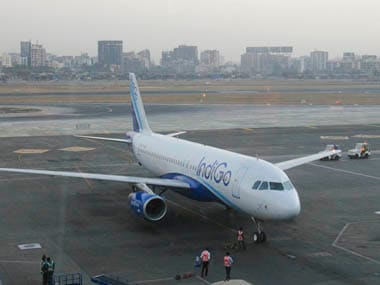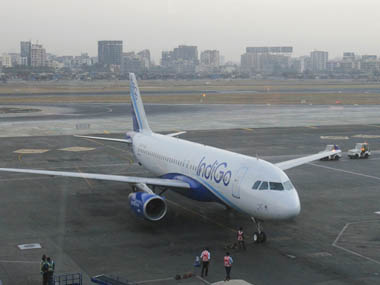Why have airlines raised fares by as much as 25%, all together, in the last two weeks? This contentious subject is sure to be a part of the discussion between CEOs of all domestic carriers who arrive for their quarterly meeting with senior officials of the Ministry of Civil Aviation this afternoon at New Delhi’s Rajiv Gandhi Bhawan. The captains of airline industry will represent Jet Airways, SpiceJet, IndiGo, GoAir and Air India.
Though senior ministry officials have been at pains to explain that the Government has no role in determining ticket prices and therefore it cannot dictate prices to airlines, the very fact that airfares will form a major part of today’s discussion shows how concerned the Ministry is over this issue.
[caption id=“attachment_1106549” align=“alignright” width=“380”]  Reuters[/caption]
A senior Government official, who will be attending this meeting, said on condition of anonymity that there are grave fears within the Ministry of passenger traffic falling sharply because of the steep increase in fares. “We want to know how the industry answers these questions. We cannot dictate fares but concerns on these affecting growth are genuine and will be placed before airline CEOs,” this official said.
Already, a passenger association has taken the fare hike issue to the Competition Commission of India, alleging a cartelization by airlines since they all simultaneously increased fares, citing a sharp increase in jet fuel prices and rupee depreciation.
Impact Shorts
More ShortsCan the Ministry nudge airlines to roll back some of this increase? This may well happen - earlier this year, aviation regulator DGCA had nudged airlines to desist from participating in a bloody fare war when SpiceJet had launched a fire sale and every other airline wanted to follow suit. Gentle threats and subtle hints sure work wonders for Indian airlines, which still have to get important clearances such as for importing aircraft from the Government.
A second important issue likely to come up for discussion today is a grievance of those state Governments which have actually removed the punishing sales tax on jet fuel in recent months, after long persuasion by the Ministry. These states are feeling cheated now because neither have airlines given them better connectivity by increasing flights nor have they refrained from charging exorbitant fares during peak season.
Last week, Civil Aviation Minister Ajit Singh invited civil aviation ministers and secretaries from all states Governments and urged them to remove sales tax on Aviation Turbine Fuel. ATF accounts for almost two-thirds of an Indian airline’s operating costs. At this meeting, representatives of some states came forward and point out how airlines have been taking their sales tax abolition for granted.
Isn’t it fair that states which have lowered sales tax (it varies from 4-30%) get better connectivity and lower fares compared to those who continue to tax ATF at peak rates? Airlines will be asked why states which have been benevolent on ATF taxation are not reaping any benefits.
The official quoted earlier said that though a proposal to amend the five year, twenty aircraft rule was under active consideration of the Ministry, it was unlikely to be taken up with CEOs at today’s meeting. “It is possible that GoAir representatives raise it but the Ministry is not keen to discuss it at today’s meeting,” this official said.
The five year, twenty aircraft rule makes it mandatory for any domestic airlines to complete five years of domestic operations and have a 20-aircraft fleet before it is allowed to fly overseas.


)

)
)
)
)
)
)
)
)



